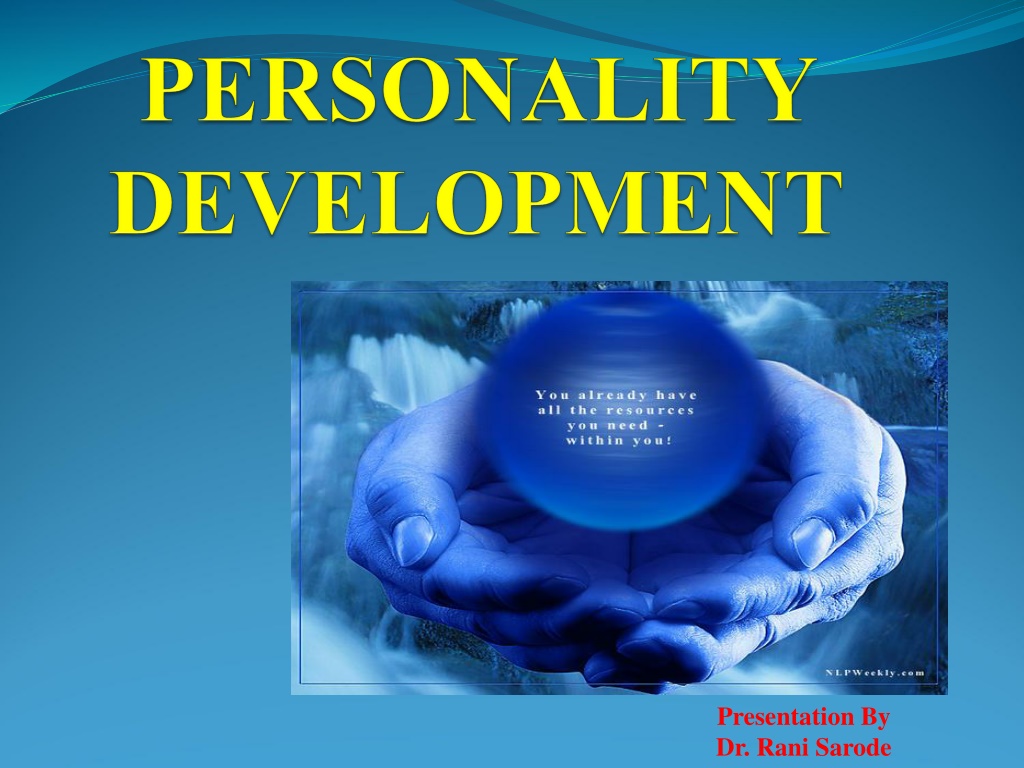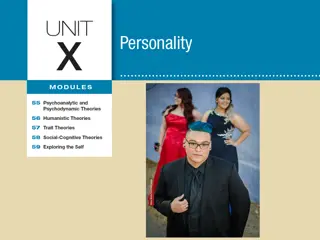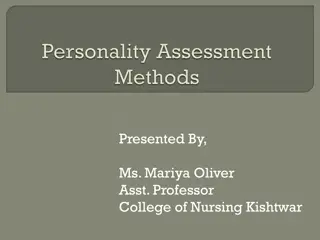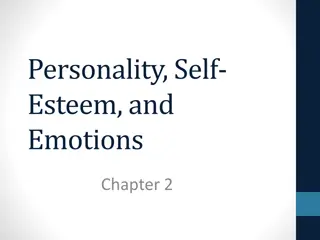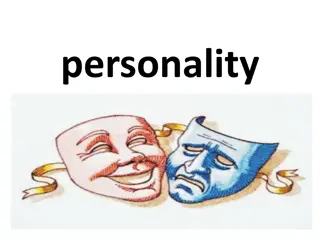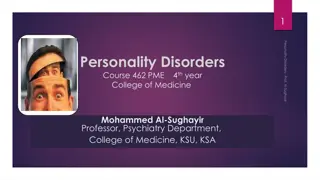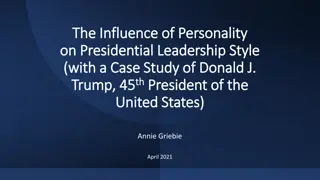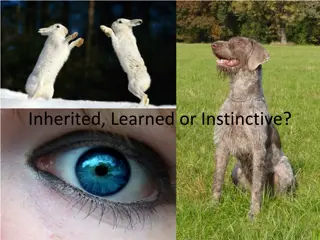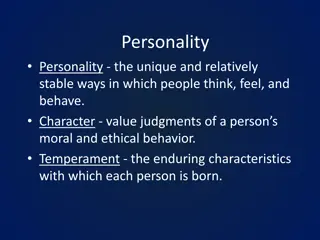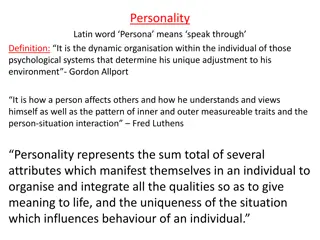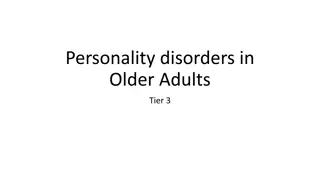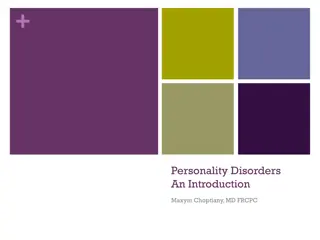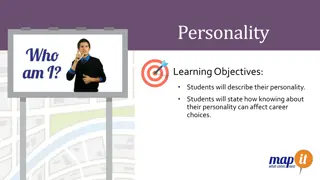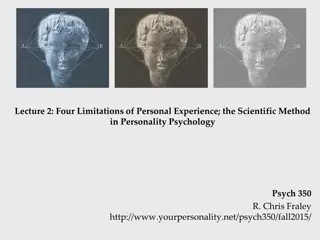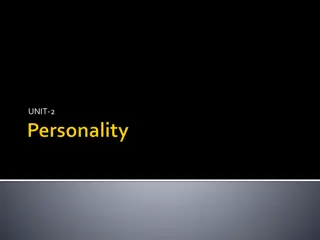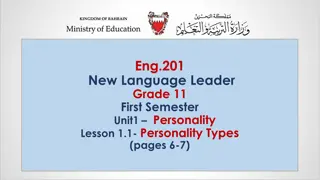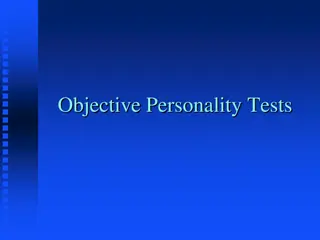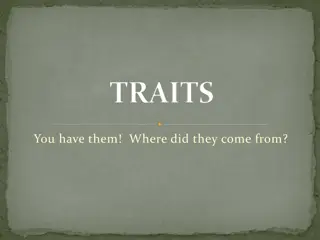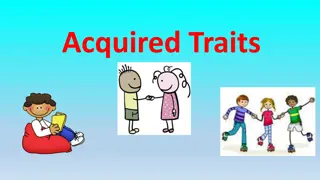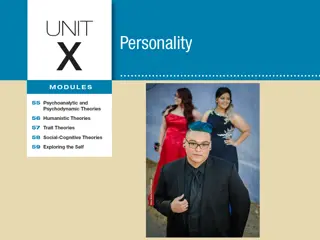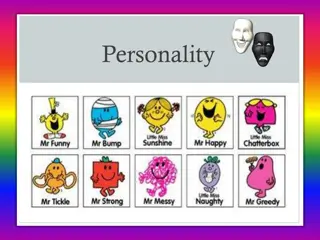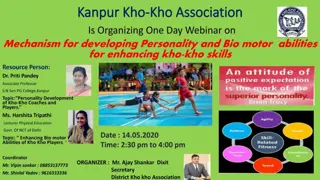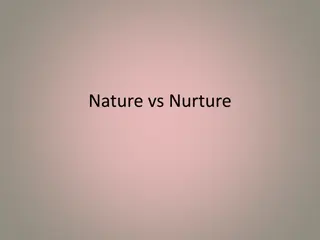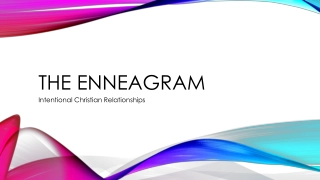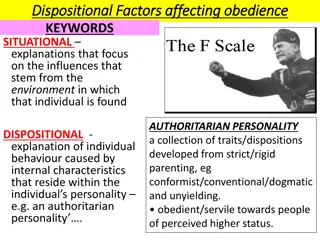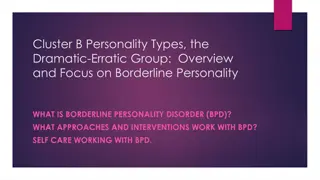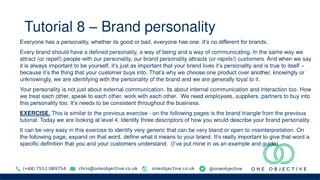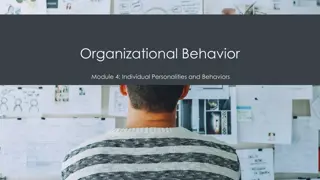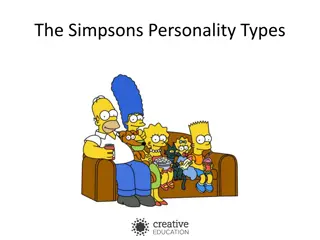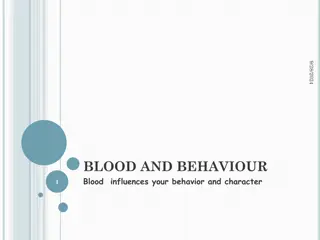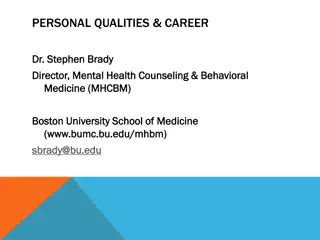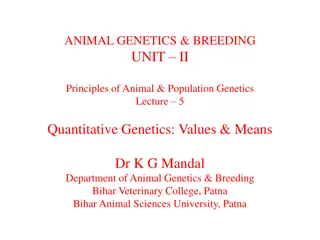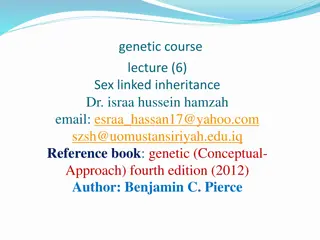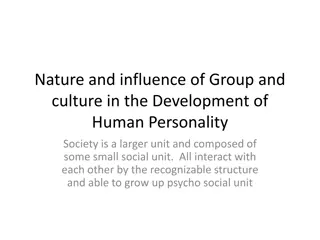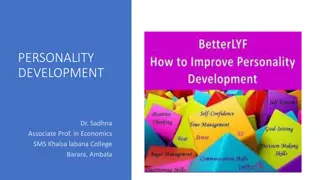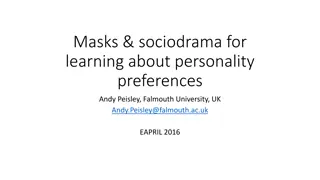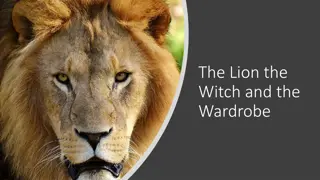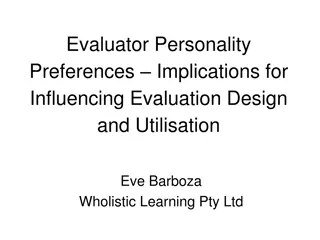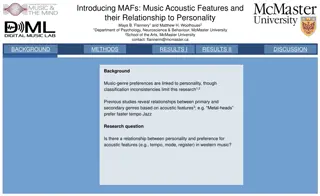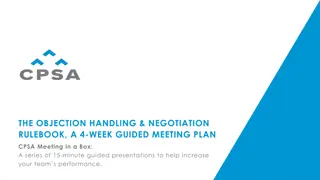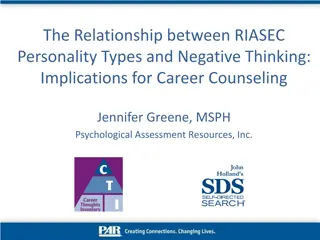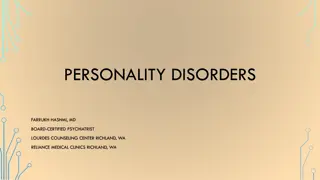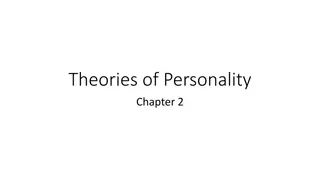Exploring Personality Development and Traits
Understanding the importance of personality development, this presentation by Dr. Rani Sarode delves into the various aspects that define an individual's character and behavior. It discusses the significance of traits like communication skills, interpersonal relationships, attitude towards life, and ethical values. The presentation also explores different types of personalities such as Perfectionists, Helpers, Romantics, Achievers, Questioners, Adventurers, Observers, Asserters, and Peacemakers, highlighting notable figures embodying these traits. Moreover, it emphasizes the value of acquiring essential skills, enhancing self-confidence, and self-worth. Lastly, it introduces a personality test to identify one's value system, emotional responses, moods, and characteristics.
Download Presentation

Please find below an Image/Link to download the presentation.
The content on the website is provided AS IS for your information and personal use only. It may not be sold, licensed, or shared on other websites without obtaining consent from the author. Download presentation by click this link. If you encounter any issues during the download, it is possible that the publisher has removed the file from their server.
E N D
Presentation Transcript
Presentation By Dr. Rani Sarode
A man is identified by his personality public image. It is the totality of the person and not merely external looks, but character, behavioral traits and attitude towards life. Personality development is the improvement of behavioral traits such as communication skills, interpersonal relationships, attitude towards life and restoring our ethics.
Know your personality Character traits Behavioral traits Attitudinal Change Interperso nal Skills Positive Attitude Integrity Communica tion Skills Win-win situation Acceptance Leadership Qualities Keep the end in mind Discipline Stress and Time management Dedication Synergise
TYPES OF PERSONALITY Nine Types Perfectionists Helpers Romantics Achievers Asserters Questioners Adventurers Observers and Peacemakers.
Cont.. Perfectionists are realistic, conscientious and principled Ex: Narayan Murthy Infosys. Helpers are warn, concerned, nurturing and sensitive to other people s needs Ex: Mother Teresa. Achievers are eneagetic, optimistic, self assured and goal oriented Ex: Sachin Tendulkar Romantics have sensitive feelings and are warm and perceptive Ex: M. F. Hussain great Indian Painter Observers have a need for knowledge and are introverted, curious, analytical and insightful. Ex: Amartya Sen - Great economist
Cont.. Questioners are responsible and trustworthy. Ex: Shabana Azmi Adventurers are energetic, lively and optimistic. They want to contribute to the world Ex: - NRI businessman. Asserters are direct, self-reliant, self confident and protective. Ex: T. N. Seshan - Chief Election Commissioner. Peacemakers are receptive, good-natured and supportive. They seek union with others and the world around them Ex: Atal Bihari Vajpayee.
It can help in the following ways To learn the business etiquette of exchanging cards, wishing on first meeting, bowing when you are visiting Japan and the like. Voice modulation, diction, communication skills, phone etiquette, hygiene, empowerment skills, time management and positive thinking. To cultivate a friendly, interactive manner. Essentials like giving a speech, voice development and modulation of voice. It enhances the sense of confidence and self-worth.
PERSONALITY TEST This can identify: Value system Emotional reaction to a critical situation Moods and characteristic behaviour traits. Maturity in handling a crisis. Ability to adjust himself to the stress of day-to-day executive lifestyle. Self-confidence, personal ambition, emotional control and sociability etc.
BODY LANGUAGE Body language communicates much more than words. Body language signals leakages because you may try to tell something, but the truth will leak out visually. are called
AVOID SUCH BODY LANGUAGE Crossed arms or legs Carrying books or papers across your chest Slumped posture Sitting perched on the edge of the chair Wringing hands Tapping foot Rocking legs Drumming fingers Biting nails
Cont.. Fiddling with the jewelry or hair Covering your mouth with your hand while talking Rocking in your chair Scratching a lot Clearing your throat too much Straightening your tie Playing with watch or cufflinks Hands in the pocket
LOOKING AGGRESSIVE Arms folded across the chest Staring Pointing Making a fist Leaning over someone
BEHAVING RUDELY Working when someone is talking to you Puffing Tollering Smirking Whispering Cracking knuckles Grooming yourself Standing too close Packing up folders and papers well before the meeting is over Shaking hands too hard or limp handshakes
Cont.. Yawning when the meeting is in progress Looking at your watch repeatedly Blinking a lot Fiddling with rings, watches, earrings and chains Tapping or clicking pens Playing with paper clips Jingling money in pocket Picking at fingernails Twiddling bits of hair Smoking
LEADERSHIP QUALITIES Courage Self-control A keen sense of justice and fairness Definiteness of plans The habit of doing more than being paid for A pleasing personality Sympathy and understanding Mastery of details Willingness to assume full responsibility Co-operation
PERSONAL QUALITIES accurate adaptable astute can work under pressure careful committed competent cooperative courteous
Cont.. decisive dedicated energetic methodical meticulous orderly organized positive practical
Cont.. extrovert flexible friendly get on well with other people good communicator good sense of humour good time-keeper hard working imaginative
Cont.. independent worker lively logical loyal self confident self motivated sensitive thorough thoughtful vigilant work well with others
Determinants of personality Family & Social factors Biological factors Cultural factors Situational factors 1.Socialisation process (Behaviour from family & social group) 1. Independence- Australia Heredity 2. Identification process ( Selecting ideal person) 1.Positive behaviour 2. Aggression- North Korea Brain 3. Competition- India 2.Negative behaviour 3. Physical features 3. Home environment (Brought up) 4. Co-operation- Japan 4.Social Group.
Hollands Personality-Job Fit Theory Type Personality Occupations Mechanic, Farmer, Assembly-Line Worker Realistic Shy, Stable, Practical Biologist, Economist, Mathematician Investigative Analytical, Independent Social Worker, Teacher, Counselor Social Sociable, Cooperative Accountant, Manager Bank Teller Conventional Practical, Efficient Enterprising Ambitious, Energetic Lawyer, Salesperson Painter, Writer, Musician Artistic Imaginative, Idealistic Prentice Hall, 2001 21
Type A and B Type A Personality Type B Personality Always moving, walking, and eating rapidly. Never suffer from a sense of time urgency with its accompanying impatience. Feel impatient with the rate at which most events take place. Feel no need to display or discuss either their achievements or accomplishments unless such exposure is demanded by the situation. Strive to think or do two or more things at once. Cannot cope with leisure time. Are obsessed with numbers, measuring their success in terms of how many or how much of everything they acquire. Play for fun & relaxation, instead of exhibit their superiority at any cost. Can relax without guilt.
Big 5 in Short Personality Factors Characters Conscientiousness Careful, dependable and self disciplined 1. Agreeableness Courteous, good natured, empathic and caring. 2. Poised, secure and calm. Neuroticism 3. Sensitive, flexible, creative and curious. Openness 4. Outgoing and cautious. 5. Extroversion
THANK YOU THANK YOU
